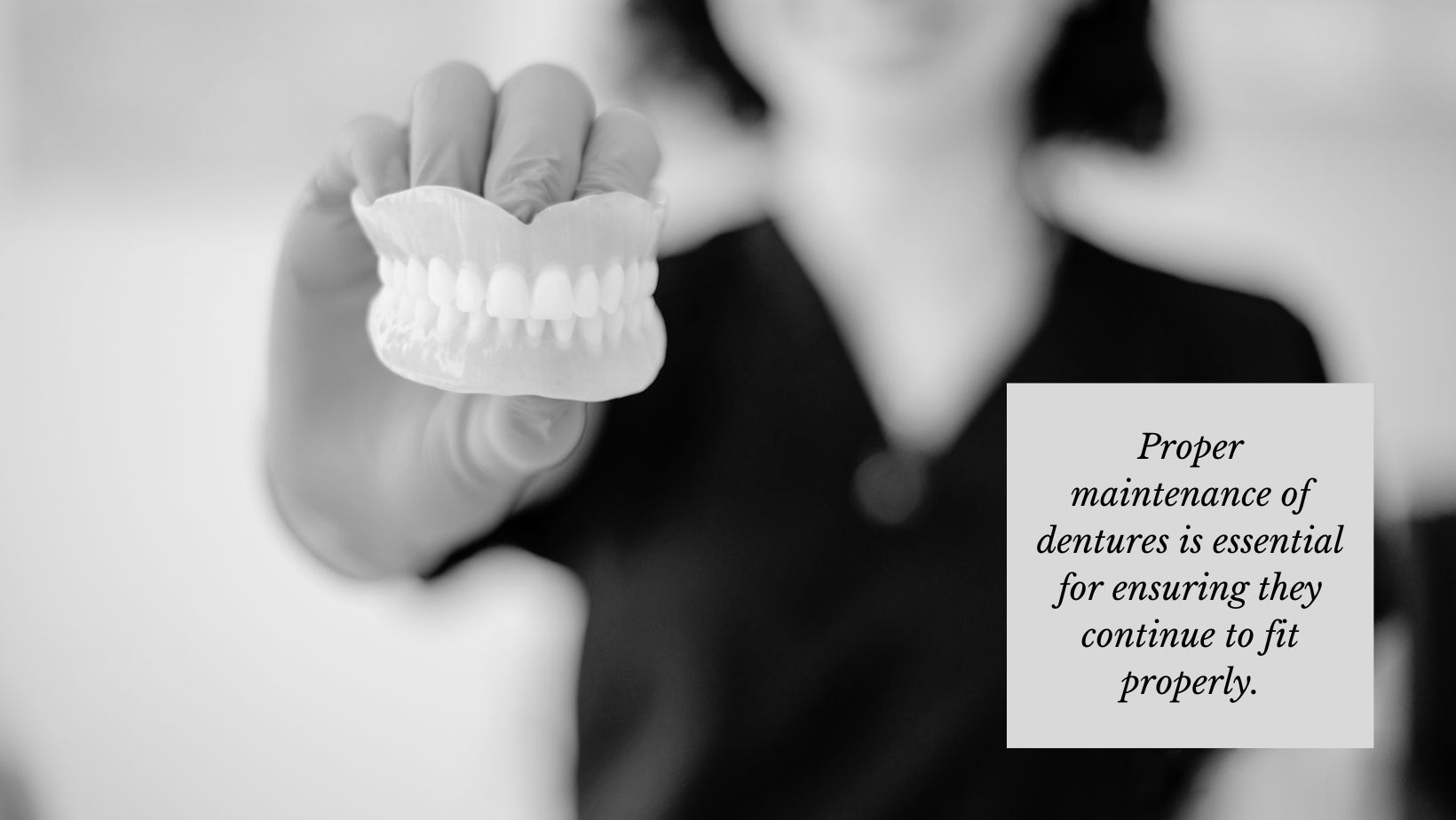When you get dentures, they should feel comfortable and secure. When they fit well, dentures feel natural in your mouth and allow you to talk, eat, and drink normally. Modern technologies and materials used to create dentures make customizing them for each patient easier than ever so they feel snug and do not cause discomfort. Your dentist will work with you to make sure new dentures fit properly.
However, some conditions such as receding gums can make it tricky to get a perfect fit the first time. Ill-fitting dentures can cause discomfort and even health issues. If dentures do not feel comfortable after wearing them for a few days, you may need some adjustments.
How Should Dentures Fit?
Also called dental plates, dentures are removable appliances that replace missing teeth. Whether a patient’s dentures replace just a few teeth or an entire upper or lower arch, properly fitted dentures feel comfortable and snug in the mouth. They should not feel too tight and should not slip and slide sound when the patient talks or eats. A good fit also means dentures do not pinch or rub against the gums and cheeks.
The base of the dentures should suction smoothly against the patient’s gums to stay in place. The teeth on the dentures should meet evenly when biting down, and the bite should feel natural.
Overall, well-fitting dentures allow patients to eat, speak, smile, and go about daily life without irritation or difficulties. New denture patients might need some time to get used to them, but dentures that truly fit right should not cause any lingering discomfort. If dentures do not fit properly, patients can experience trouble eating, pain, and other problems.
Can Ill-Fitting Dentures Cause Problems?
Dentures that do not fit well can lead to some uncomfortable side effects and oral health issues. Rubbing and friction from a poor fit can make gums and cheeks feel raw and sore. The dentures may also trap food particles and allow bacteria to build up, increasing the risk of gum disease and infections.
In some cases, ill-fitting dentures that put pressure on the muscles around the jaw can even contribute to headaches, earaches, and sinus discomfort or congestion. Bite misalignment from a poor fit may cause TMJ disorder and its associated pain, too.
So while some mild irritation is normal when first getting used to new dentures, persistent pain or difficulties are signals that the fit needs to be adjusted by the patient’s dentist. In addition, regular dental check-ups are essential to monitor the fit of dentures and address any issues promptly.
How to Make Dentures Fit
After the initial fitting appointment with the dentist, there are some steps patients can take to ensure their dentures fit properly over time.
Denture Maintenance
Proper maintenance of dentures is essential for ensuring they continue to fit properly. Patients should clean their dentures daily with a denture brush and mild soap or denture cleaner to remove food particles and plaque. Abrasive materials and harsh chemicals—even those in some toothpaste—can damage dentures and should be avoided.
When not in use, patients should store their dentures in denture cleaning solution or water to prevent them from drying out and warping.
Additionally, practicing good oral hygiene and maintaining regular dental check-ups are important for preserving the fit of dentures over time.
Using Denture Adhesive
Denture adhesive products help create a secure seal between the dentures and the gums. They should be used sparingly and cleaned away thoroughly between each application.
Some patients find that using a denture adhesive for extra suction and stability is helpful while first adjusting to their new teeth.
After the initial adjustment period, dentures can become loose over time due to bone shrinkage in the mouth. If dentures are slipping, a bit of dental adhesive may help them fit more securely until the patient can see the dentist.
In either case, denture adhesive is usually a temporary solution. If slipping is an ongoing problem, the patient should see their dentist to have their dentures assessed.

Avoid Hard or Sticky Foods
Though patients can eat most foods normally with dentures, avoiding hard or sticky foods can prevent damage and reduce the likelihood of dentures slipping. Patients can check with their dentist about what to avoid.
Get Dentures Adjusted at the Dentist
Patient’s mouths often change over time. It is normal for dentures to require some adjustments from the dentist after a while. One option is relining. Relining involves adding material to the underside of the dentures to adjust the fit and improve comfort. Dentists can usually perform this procedure in their office fairly quickly.
In some cases, rebasing may be necessary to make dentures fit better. Rebasing involves creating a new base for existing dentures, providing a better foundation for a secure fit. For this procedure, the dentist takes impressions of the patient’s mouth to create a new base that matches their natural gum line. Dentures are then reworked at the lab.
It is important for patients to trust the dentist to make adjustments and not try to adjust or grind down dentures themselves. This can cause permanent damage and require dentures to have expensive repairs or be replaced entirely.
Can Dentures Be Fitted to Receding Gums?
It is very common for gums to recede and shrink over time, especially after getting teeth extracted to prepare for dentures. This gum recession can make it tricky to get a secure fit with dentures since the gum ridge they rest on keeps changing shape.
The good news is that dentures can be refitted and relined to accommodate receding gums. Dentists can reline the denture base with fresh acrylic material to ensure smooth suction against the patient’s current gum line.
More extensive gum changes may require getting a whole new set of dentures manufactured to adapt to changes in the patient’s mouth. But don’t worry – refitting is a routine part of denture maintenance for most patients over the years.
Work With Your Dentist for a Great Fit
Dentists work together with their patients to make sure dentures fit securely and comfortably. Getting any issues corrected quickly helps avoid larger problems, so be sure to see the dentist promptly at the first sign of irritation or if dentures feel loose.
Above all, keep communicating with your dentist if you have any fitting concerns. With some minor tweaks here and there, you can get that comfortable, secure, perfect denture fit!
If you need to find a dentist who specializes in dentures near you, try our online appointment finder.


